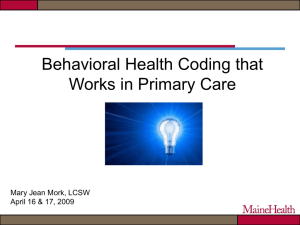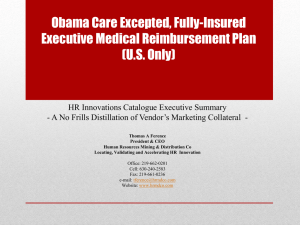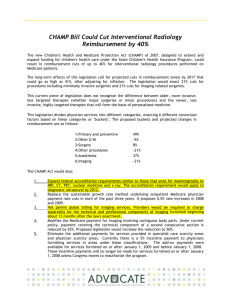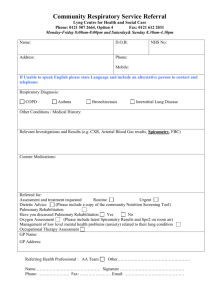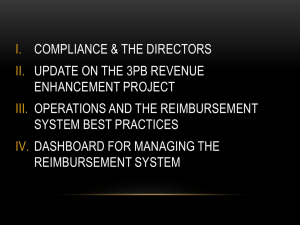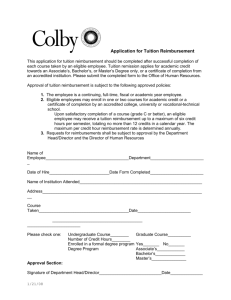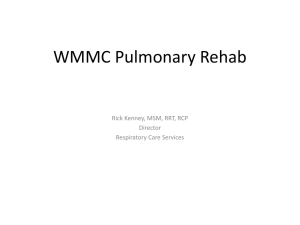Pulmonary Rehab: The Cost to Run our Programs
advertisement
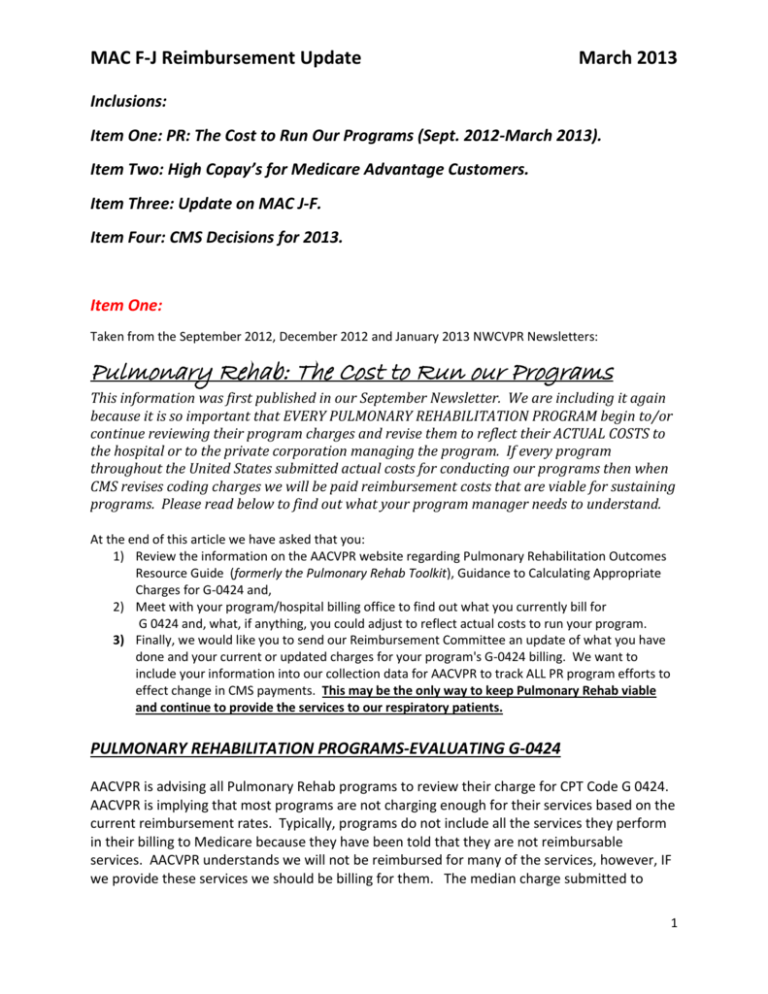
MAC F-J Reimbursement Update March 2013 Inclusions: Item One: PR: The Cost to Run Our Programs (Sept. 2012-March 2013). Item Two: High Copay’s for Medicare Advantage Customers. Item Three: Update on MAC J-F. Item Four: CMS Decisions for 2013. Item One: Taken from the September 2012, December 2012 and January 2013 NWCVPR Newsletters: Pulmonary Rehab: The Cost to Run our Programs This information was first published in our September Newsletter. We are including it again because it is so important that EVERY PULMONARY REHABILITATION PROGRAM begin to/or continue reviewing their program charges and revise them to reflect their ACTUAL COSTS to the hospital or to the private corporation managing the program. If every program throughout the United States submitted actual costs for conducting our programs then when CMS revises coding charges we will be paid reimbursement costs that are viable for sustaining programs. Please read below to find out what your program manager needs to understand. At the end of this article we have asked that you: 1) Review the information on the AACVPR website regarding Pulmonary Rehabilitation Outcomes Resource Guide (formerly the Pulmonary Rehab Toolkit), Guidance to Calculating Appropriate Charges for G-0424 and, 2) Meet with your program/hospital billing office to find out what you currently bill for G 0424 and, what, if anything, you could adjust to reflect actual costs to run your program. 3) Finally, we would like you to send our Reimbursement Committee an update of what you have done and your current or updated charges for your program's G-0424 billing. We want to include your information into our collection data for AACVPR to track ALL PR program efforts to effect change in CMS payments. This may be the only way to keep Pulmonary Rehab viable and continue to provide the services to our respiratory patients. PULMONARY REHABILITATION PROGRAMS-EVALUATING G-0424 AACVPR is advising all Pulmonary Rehab programs to review their charge for CPT Code G 0424. AACVPR is implying that most programs are not charging enough for their services based on the current reimbursement rates. Typically, programs do not include all the services they perform in their billing to Medicare because they have been told that they are not reimbursable services. AACVPR understands we will not be reimbursed for many of the services, however, IF we provide these services we should be billing for them. The median charge submitted to 1 MAC F-J Reimbursement Update March 2013 Medicare in 2010 was $150 which translated to the reduced reimbursement rate of $37 for this year and will be ~$40 in 2013. (It was $63 in 2011) The CALL TO ACTION: 1. Please take the time to read through the attached “Pulmonary Rehabilitation Outcomes Resource Guide”(formerly the “Pulmonary Rehab Reimbursement Toolkit”) provided by AACVPR. Or, you can go to: https://www.aacvpr.org/HealthPublicPolicy/PulmonaryRehabilitationReimbursementToolkit/ta bid/555/Default.aspx 2. Find out what your hospital or program charges for G 0424. Review your charges with your finance department and administrator. Determine if you need to change your charge amount and if so, to what. Background: CPT Code G 0424 is the required code to use for any Pulmonary Rehab session for a patient who is covered by Medicare and has a diagnosis of moderate, severe or very severe COPD (mild COPD is not covered; basis is FEV1.) This new code and regulation took effect under the new Medicare law 01/01/2010. G 0424 is a "bundled service" code, meaning that Medicare recognizes that various services may be provided during a single visit (e.g., exercise therapy, oxygen therapy, pulse oximetry, Six minute walk, education, etc.). Consequently, Medicare had no specific data to base its reimbursement for G 0424 in 2010 and 2011, other than an educated guess that charges submitted by hospitals for G 0424 would be significantly higher than charges for the other CPT codes (G 0239, G 0238, G 0237) used for Respiratory Services (that we call pulmonary rehab) for non-COPD Medicare patients and all other non-Medicare patients. Medicare applied its reimbursement formula to come up with ~$63 as a figure for reimbursement for G 0424 for 2010. Meanwhile, most hospitals kept their charges for G 0424 similar to their charges for G 0239. Then, when Medicare reviewed actual bills submitted by hospitals in 2010-11, it applied the same formula and decided that the reimbursement for G 0424 should be reduced to $37, effective 01/01/12. Please let us know the outcome of your effort. This is a national effort. We need everyone to participate. A member of the Reimbursement Committee will follow-up with you. Greg Lawson at gregory.lawson@providence.org<mailto:p@providence.org> Additional Note: 2 MAC F-J Reimbursement Update March 2013 Starting in 2013, PR programs applying for certification or recertification must show evidence of one year of outcomes measurement. The toolkit provides key resources to assist your program in this transition to outcomes measuring; including tools to measure functional capacity, symptoms, quality of life and much more Item Two: NWCVPR – A CALL TO ACTION! for Cardiac and Pulmonary Programs: High Patient Co-Pays-in Medicare Advantage Programs Regarding the complaints recently over the relatively high co-pays for both Pulmonary and Cardiac Rehabilitation assessed on Medicare patients who are Medicare Advantage members: Over the past 1 ½ years, there has been an increasing amount of referred patients who have high co-pays per visit ($30+). These co-pays are a potential financial threat to many programs if they become the norm and if most patients choose not to participate because of them. Most of these patients chose the Medicare Advantage plans that are managed by companies such as Humana, SoundPath, Regence, and many others. Most of these companies offer several tiers of coverage. The plan with the lowest per month fee has the highest co-pay per visit, and viceversa. Most subscribing patients choose the lower priced monthly plan. Cardiac and Pulmonary rehab, while “covered” by most of these plans, are lumped in with “specialists” and thus have the high co-pay per visit. AACVPR is aware of this issue. The issue is more or less significant in different parts of the country. For example, apparently the co-pays in Florida are no higher than $15 since Florida Medicare Advantage plans receive more funding per capita than we do in the Northwest. The CALL TO ACTION: 1. Collect and submit the following data to NWCVPR Reimbursement Committee (info@nwcvpr.com and include Co-Pays in subject line) in as much detail as you can for 3-6 months. How many referred patients chose not to participate because of high co-pays? How many participating patients reduced their LOS or dropped out because of these high copays? What percentage do these numbers represent in terms of total participation in your program? What is the name of the company and the plan? Greg Lawson is the committee chair for NWCVPR’s Reimbursement Committee. He can be reached at gregory.lawson@providence.org<mailto:p@providence.org 3 MAC F-J Reimbursement Update March 2013 NWCVPR Contact information: NWCVPR email address: info@nwcvpr.com Starting summer 2012 we began sending all our eblasts to membership from the above email address, including this newsletter. Please add this address to your address book. Item Three: Reimbursement Update on MAC-J-F (formerly J2+J3) In case you missed this in September: ….from our Reimbursement Chairperson, Joyce Kratz-Klatt: We (the former J2) have joined with the former J3 (North Dakota, South Dakota, Montana, Wyoming, Utah and Arizona) to create the MAC J-F. Our Medical Director is Bernice Hecker. Joyce has had initial email contact with Dr. Hecker to introduce herself. As the Reimbursement Chair, Joyce will serve as our liaison to Dr. Hecker for our NW and Oregon (OCVPR) region. Holly Bright, from Arizona will serve as the liaison for the former J3 group of states. Joyce and Holly will collaborate on questions before presenting them to Dr. Hecker. Please use the contact information below for your questions and/or concerns pertaining to reimbursement. Dr. Hecker appreciates that individual programs will not be contacting her directly but will use the ‘contact tree’ set up previously. AACVPR Reimbursement Chairperson: Joyce Kratz-Klattjkratz-klatt@kmc.org CARDIAC REHABILITATION WASHINGTON LIASON: Greg Lawson Gregory.Lawson@Providence.org PULMONARY REHABILITATION WASHINGTON LIASON: Heidi Jibby jibby@st-lukes.org Item Four: AACVPR Announces CMS decisions for 2013 CMS (Centers for Medicare and Medicaid Services) has posted on the CMS website final regulations for the Hospital Outpatient Prospective Payment System (HOPPS) and Physician Fee Schedule(PFS) rules for 2013. The regulations are posted in the Federal Registry as well. 4 MAC F-J Reimbursement Update March 2013 Cardiac Rehabilitation Payment-Hospital Setting In the hospital outpatient (hospital owned) setting, the CR reimbursement rate for both CPT 93797 and 93798 is slated for $79.91 payment, effective January 1, 2013. This is a national average and will vary based on geographic location due to adjustments related to labor costs. The co-payment amount is $15.99. Pulmonary Rehabilitation Payment-Hospital Setting Pulmonary Rehab received a modest increase to $39.31 for HCPCS code G-0424. Co-payment amount is $7.02. Respiratory services (what those in the field refer to as “pulmonary rehab” for patients with a non-COPD respiratory disease) also received an increase to $35.09 per 15 minutes for the timed procedures codes, G0237 and G0238 and the un-timed group exercise therapy code, G0239. The co-payment amount will be $7.02. Cardiac and Pulmonary Rehabilitation Payment-Physician Setting Payment for cardiac and pulmonary rehabilitation services in the physician setting is calculated using a different formula than that used for hospitals. It is not known at this time what the reimbursement rate will be for these services because it is tied to the Sustainable Growth Rate (SGR), which is scheduled to receive a significant cut in 2013 (-29%). Congress is expected to address the SGR and physician payment in the near future, possibly during the current lame duck session. Note: AACVPR will be holding a workshop on March 6th in Washington DC concerning the high co-pays that affiliates are reporting in their state/region. This will be in conjunction with the Day on The Hill (DOTH event, scheduled for March 6-7, 2013). An afternoon, 2-3 hour session will include experts from the insurance industry, both commercial and Medicare sector, to address the high co-pays that CR and PR programs are increasingly facing. Participants will be given strategies to take back and put into action at the local payer level. 5
